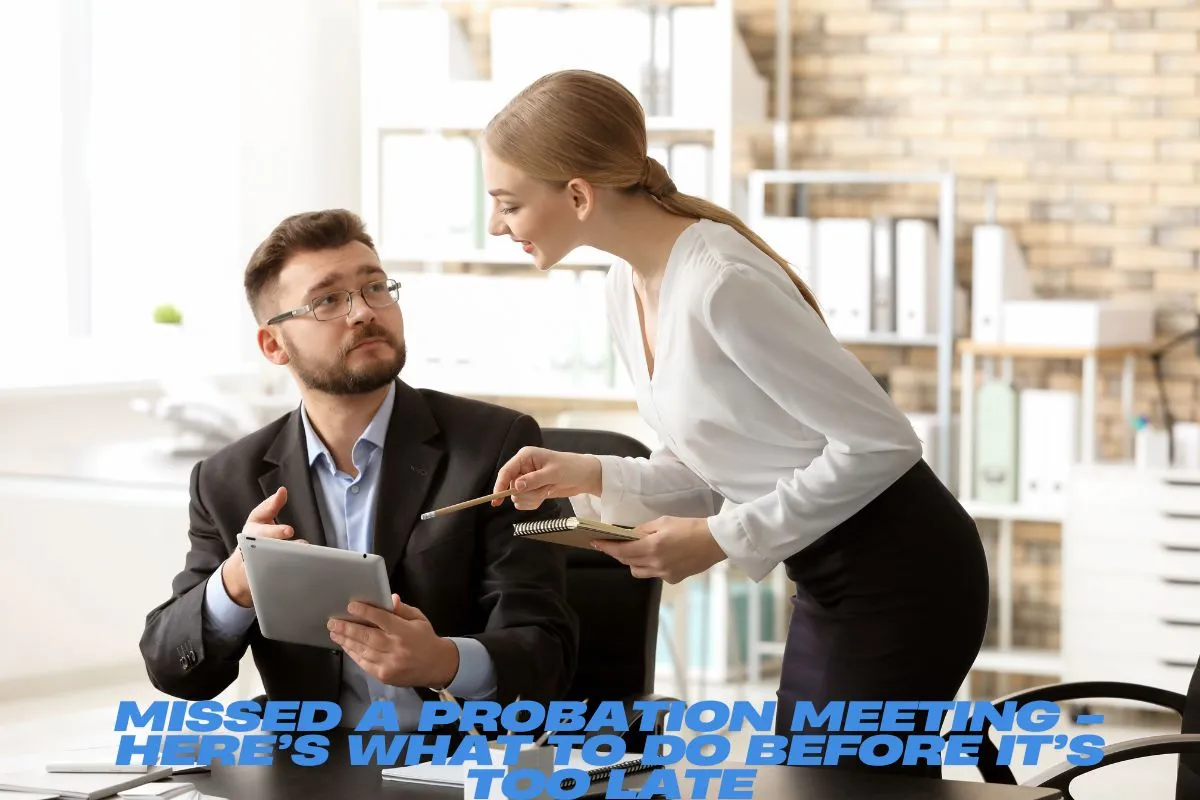Probation is an opportunity to serve your sentence outside of jail, but it comes with strict rules. One of the most important conditions is meeting with your probation officer regularly. Missing just one meeting can put your freedom at risk, leading to a probation violation that could result in serious consequences. It is designed to allow you to remain in the community under specific conditions, ensuring that you comply with all requirements set by the court.
If you’ve missed a probation meeting, don’t panic – but don’t ignore it either. Taking the right steps immediately can help you avoid a warrant, additional penalties, or jail time. Here’s what you need to know and what you should do to fix the situation before it spirals out of control.
Understanding the Consequences of a Missed Probation Meeting
Missing a probation meeting isn’t just an inconvenience; it’s a potential legal violation. Your probation officer has the discretion to report the missed appointment to the court, which could lead to a variety of penalties, including:
- A warning or increased supervision if this is your first offense.
- Additional probation conditions such as community service or mandatory check-ins.
- Probation revocation and jail time if the court deems your violation serious enough.
The severity of the consequences depends on your prior record, your relationship with your probation officer, and whether you’ve violated probation in other ways.
Step 1: Contact Your Probation Officer Immediately
If you’ve missed a meeting, the worst thing you can do is wait and hope it goes unnoticed. Instead, call your probation officer as soon as possible. A direct and honest explanation might help reduce the consequences.
- If you had an emergency, provide documentation (e.g., a doctor’s note, proof of car trouble, or a work-related conflict).
- If it was a simple mistake, own up to it and ask for a chance to reschedule.
Probation officers have some discretion when it comes to handling minor violations. Being proactive and responsible can help them see that you’re still committed to fulfilling your probation terms.
Step 2: Gather Proof of Why You Missed the Meeting
Even if you’ve already spoken with your probation officer, gathering supporting evidence can strengthen your case. If you missed the appointment due to circumstances beyond your control, having documentation can make all the difference.
Examples of acceptable proof include:
- Medical records if you were ill or hospitalized.
- A mechanic’s bill if your car broke down.
- A signed letter from your employer if work caused the conflict.
Courts are more likely to be lenient if they see that your absence wasn’t intentional.
Step 3: Consult a Probation Violation Criminal Lawyer
Missing a probation meeting can have serious consequences, especially if your officer files a violation report. This is where a probation violation criminal lawyer becomes essential.
A lawyer can:
- Communicate with your probation officer to clarify the situation.
- Gather and present evidence that supports your case.
- Defend you in court if necessary, arguing for reduced penalties or alternative solutions.
Having legal representation can make the difference between a warning and a revoked probation sentence. If you believe your probation officer will escalate the situation, seek legal help immediately.
Step 4: Understand the Role of Criminal Defense Investigation
In cases where a probation violation leads to legal action, a criminal defense investigation can be crucial. Defense attorneys often work with investigators to uncover details that could strengthen your case. Blackledge Investigations serving Connecticut provides thorough investigative services that can help gather evidence, verify claims, and support your defense. This can include:
- Reviewing surveillance footage or phone records to confirm your whereabouts.
- Interviewing witnesses who can verify your reason for missing the meeting.
- Examining inconsistencies in the probation officer’s report.
If there’s evidence that you were unfairly accused or that your violation wasn’t intentional, an investigator can help uncover it. This added layer of defense can prevent harsh consequences and protect your legal rights.
Step 5: Show Up for Your Next Meeting No Matter What
Once you’ve taken steps to address the missed appointment, make sure it doesn’t happen again. Judges and probation officers are more forgiving of one mistake, but repeated violations can be seen as a sign of non-compliance.
To avoid missing another meeting:
- Set reminders on your phone or calendar.
- Confirm appointment times in advance.
- Leave early to avoid traffic or unexpected delays.
Being punctual and responsible demonstrates to your probation officer that you’re taking your obligations seriously.
Step 6: Prepare for a Probation Violation Hearing (If Necessary)
If your probation officer decides to report the missed meeting, you may have to attend a probation violation hearing. This is where a judge will decide whether to enforce penalties.
To prepare:
- Have your lawyer present evidence showing that you didn’t willfully violate probation.
- Show proof of your overall compliance with probation conditions.
- Demonstrate that you’ve taken corrective measures to prevent future issues.
A strong defense can prevent your probation from being revoked and may even lead to reduced penalties.
Did you know that probation started with a shoemaker?
In the 1800s, a Boston cobbler named John Augustus began bailing out low-level offenders and helping them turn their lives around instead of serving jail time. His efforts eventually led to the modern probation system, which now helps millions of people avoid unnecessary incarceration while still holding them accountable.
Missing a probation meeting is a serious issue, but it’s not the end of the world – if you act quickly. The key is to be proactive: contact your probation officer, provide proof of your absence, consult a lawyer, and make sure it doesn’t happen again.



